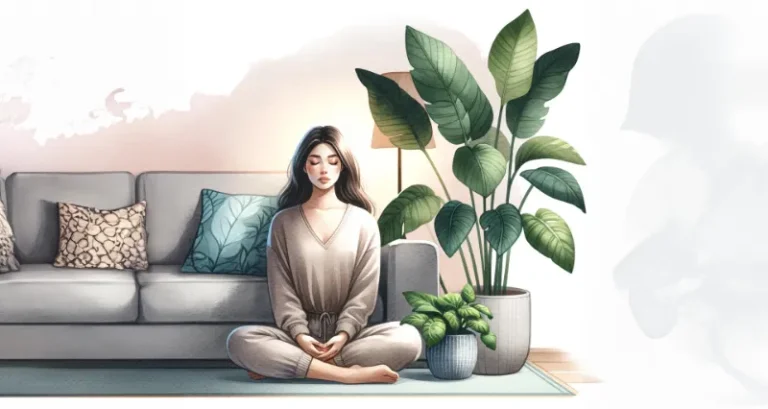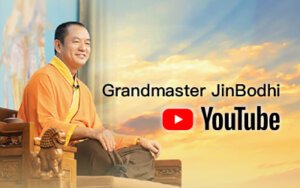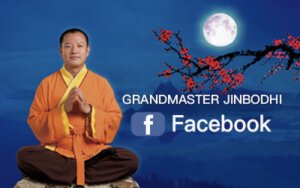
Meditation allows people to settle their thoughts, think with clarity, and eliminate unnecessary mental disturbances. Learning meditation can lead a person to regain peace of mind. Bodhi Meditation will guide you on how to start practicing meditation and what the benefits are, answering your questions one by one.
What Is Meditation?
The literal meaning of meditation is a practice related to Zen. Similar concepts include mindfulness, peaceful visualization and so on. Although the names are different, their purposes are generally the same: to purify the body and mind and obtain deep inner tranquility or a still state of mind.
Grandmaster JinBodhi has stated that the process of purifying the body and mind through meditation is like scooping a bucket of water from a natural river. In the beginning, the water is turbid, containing sand, leaves and other matter. When the water is left still for a while, heavier substances slowly settle to the bottom, and lighter substances float to the top. The water in the middle portion will be relatively clear.
Meditation helps us settle our hearts, allowing our purity and wisdom to appear naturally.
What Are the Benefits of Meditation?
People nowadays experience constant disturbances from external sources; pressures from relationships, career and financial issues create distress and fatigue. When all kinds of information flow into the brain without letup, mental burdens increase and physical health declines.
The most direct effect of meditation is the pacification of the disorganized mind. A peaceful mind can bring about a series of physical and mental benefits for practitioners. Dr. Hasekawa U Zaburo of Japan stated in Shinizengaku that meditation could treat the following diseases:
- Neurosis
- Chronic gastroptosis
- Hyperacidity or hypochlorhydria
- Gastrointestinal atony
- Skin and bowel disease
- Chronic constipation
- Tuberculosis
- Diarrhea
- Insomnia
- Gallstones
- Indigestion
- High Blood Pressure
Scientists in the United States found that Buddhist monks’ brain-blood oxygen level was significantly higher than that of nonmeditators. Also, meditators have more active cranial nerves related to concentration. This phenomenon further confirms the fact that meditation can improve cognitive abilities such as concentration and awareness.
Further reading: The World’s Happiest Man Is a Tibetan Monk
The experience of learning meditation had a significant impact on Steve Jobs. He applied his insights about Zen to product innovation and design. Each product he launched had a very minimalist, Zen concept: a clean and simple design, straightforward operations and practical functions. Jobs maintained the habit of meditation throughout his life and made many important decisions based on the intuition that meditation cultivated in him. Isaacson, the only authorized biographer of Jobs, wrote in his book that Jobs attributed his profound concentration and love of simplicity to meditation. Practicing meditation honed his intuition, taught him how to filter out distractions and unnecessary thoughts, and cultivated his minimalist aesthetic.
Further reading: Scientists Also Meditate
Grandmaster JinBodhi once said, “What Zen brings to people is incredible. It can turn beggars into rich people, slaves into generals and crows into phoenixes.”
Meditation can elevate one’s cognitive level. Practitioners can see the world with clarity, as they understand the Laws of Nature and the relationship between existence and emptiness; their clear vision of the external world leads to a wise view of their inner reality, and thus a reduction of internal afflictions. Practitioners develop a deep understanding of themselves and find the roots of all pain and trouble.
When you have a deeper understanding of both the external world and inner self through meditation, you’ll be able to keep your thoughts and behaviors in check. Mastering your thoughts and behaviors enables you to have a better grasp on your life.
How to Learn the Meditation Basics?
Different forms of meditation employ various postures: sitting, standing, walking, and lying down. On top of that, practice methods include chanting, breath mindfulness, concentration on breathing, opening meridians, etc. Regardless of the method one chooses, persistence is key: Only by practicing can you truly feel the beauty of Zen.
Meditation is the way of obtaining inner peace. Its purpose is the cultivation of real purity, calmness and ease; it enriches the inner life and quells the pursuit of appearances and trends. No matter what kind of practice method you choose, the key to meditation lies in settling your mind in the present and diving deep into the meditative process without being distracted by the outside world.
Many Buddhist scriptures talk about “visualization,” as it is one of the most authentic Buddhist meditation methods. It is challenging to stop the brain from producing thoughts. The more deliberately we suppress our thoughts, the more distracting they become. The visualization method taught by Grandmaster JinBodhi takes advantage of this characteristic of the brain. When the practitioner follows the correct guidance, their thoughts will be unified and gradually enter a pure, singular, peaceful, and elevated state of emptiness. Therefore, visualization practice is one of the fastest and most effective meditation methods.
Meditation Guidelines for Beginners

1. Choose a good teacher
The entry requirements for meditation are loose. Almost everyone can learn meditation, but it must be taught in person by a professional teacher. Meditation is an internal training of the mind, and there are many different methods. In the process of practicing meditation, a practitioner’s body and mind might experience some reactions. Sensitive people may even experience hallucinations. Beginners without foundation in meditation usually can’t deal with these reactions properly. If the method is wrong, it may bring about many negative consequences mentally and physically.
A professional meditation teacher must have a high level of personal experience in meditation practice, foresee possible problems in the meditation process, guide students, and correct their mistakes in time.
2. Choose a professional meditation course
For beginners in meditation, it is crucial to participate in a formal meditation course. In a professional meditation class, beginners can lay a solid foundation for further practice and receive professional guidance from the teacher in time to reduce the number of obstacles that appear in the process of cultivation.
3. If you have already received formal meditation guidance, you need to pay attention to the following when meditating at home:
Environmental Aspects
– To prevent being frightened, make sure there is no noise or interference from other people, and no factors that would make sudden sounds.
– To avoid mugginess and drowsiness, find a well-ventilated space without cold wind blowing directly onto the body.
– Don’t burn incense or spray any fragrance.
– For standing meditation, make sure that there are no fragile or sharp objects (e.g., table corners) in the space to avoid injury.
Clothing Aspects
– We recommend wearing loose, comfortable clothing made of natural fabrics.
– Do not wear excessive jewelry.
– For sitting meditation, you need a cushion of moderate firmness which maintains its shape. If you are sitting against a wall, use a backrest to avoid touching the cold wall; if there is wind in the room, cover your head, neck and waist appropriately to prevent cold wind from invading.
Closing Exercises
A professional meditation session must include complete closing exercises. Only by performing closing exercises after meditating can you gain true health and wisdom from your practice.
Bodhi Meditation Courses
Grandmaster JinBodhi has been practicing meditation since he was a child. He studied with many famous practitioners and explored meditation in-depth through personal experiences. Having benefited from meditation, he vows to pass on this powerful practice to as many people as possible, bringing them health and happiness.
Founded by Grandmaster JinBodhi, Bodhi Meditation is an international meditation organization with meditation centers in more than 10 countries and regions. Each center provides foundational meditation courses for beginners and a variety of higher-level courses, such as the Health & Happiness Retreat, chanting classes, stress-relief classes, etc. All courses guide students to learn core meditation methods step by step, understand principles systematically and apply meditation in daily life, while at the same time taking into account the diverse needs of the modern practitioner.
The various visualization methods taught in the courses are all extraordinary tantric practices handed down by Grandmaster JinBodhi so that meditators with no foundation can easily achieve purity. These methods are a perfect embodiment of a core concept in Zen: obtaining great accomplishments through simplicity.
– Easy to learn, simple to practice: Everyone can get started easily regardless of gender, age or religion.
– Remarkable results: Most students benefit greatly after only practicing for several days in a class.
– Safe to practice: Bodhi Meditation has benefited tens of millions of students around the world for nearly 30 years.
Please contact Bodhi Meditation to learn more about how to master the way to tranquility and spiritual prosperity.

